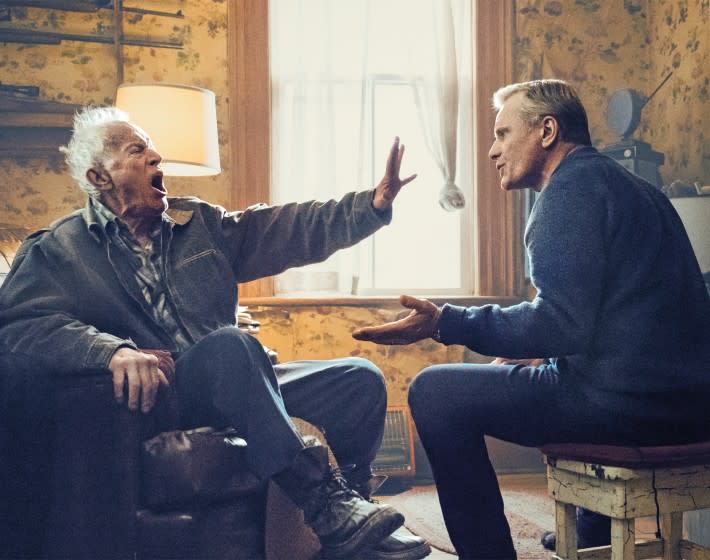Review: Viggo Mortensen's feature directing debut, 'Falling,' is a problematic journey

- Oops!Something went wrong.Please try again later.
Viggo Mortensen is a terrific actor with a wealth of memorable screen work to his credit. Unfortunately, his feature directorial debut, “Falling,” does not, er, fall into that category, though it’s not for lack of trying: He also wrote, starred in, produced and scored this problematic film.
It’s a grim, oddly misguided attempt to tell the story of the fractious relationship between a gay airline pilot, John (Mortensen), and his thoroughly insufferable dad, Willis (Lance Henriksen), as the obstreperous senior sinks into dementia.
Set, for some reason, in 2009, the film finds upstate New York farmer Willis visiting John and his husband, Eric (Terry Chen), who's a nurse, and their adopted daughter, Mönica (Gabby Velis), in Los Angeles. John wants Willis, who can no longer properly take care of himself, to move nearby, though that’s got disaster written all over it — as does most everything else that involves the black-hearted bigot.
Starting with an excruciating cross-country plane ride, in which John accompanies his father west, Willis proves himself to be a crude, misogynistic, homophobic, even sadistic clod likely to erupt at any moment. This is partly due to his withering mental state, but — as the film’s many flashbacks to John’s bucolic childhood reveal — it’s not hard to imagine a direct line from the simmering younger Willis (Sverrir Gudnason) to the boiled-over kettle he would become.
Still, hints of his own difficult daddy aside, why is he like this? Willis is largely a surface character — a blunt collection of incriminating adjectives and vile stereotypes rather than a fully dimensional character. Veteran actor Henriksen tears into the role, but a little goes a long way.
A similar lack of dimension applies to John, whose earlier adult years and, most pivotally, what had to have been a horrific coming-out to his father, go unexplored.
As if the present-day Willis needs any more fodder for his verbal venom, Mortensen surrounds him with a steady stream of potential targets: the Muslim women at the airport; the heavily tatted Chinese Hawaiian American Eric; Willis’ blue-haired grandson and goth-ish granddaughter (the children of his quavery daughter, Sarah, played by Laura Linney); then-new President Barack Obama; and many more, even if the Latinx Mönica somehow escapes his wrath. This approach proves as clunky and obvious as much else here.
And did we really need to endure the prostate exam (cue the gay slurs — again) Willis receives at the hands of his purple-gloved physician (filmmaker David Cronenberg, a frequent Mortensen collaborator)? Talk about obvious.
Mortensen, playing more than 10 years younger than his actual age, nearly vanishes amid John’s deeply stifled anger and forced calm; when he finally explodes, it feels like too little too late. The stalwart actor is simply miscast and not because he’s straight; he just brings nothing singular to his underwritten role. In addition, there’s no real chemistry between Mortensen and the similarly low-key Chen, which also doesn’t serve to sell Mortensen in the part — or Chen in his, for that matter.
(When criticized for casting himself as John, which was apparently required to help finance the film, Mortensen has spoken a bit cagily about his own sexuality. Whatever he’s been trying to say, it still didn’t enhance his performance.)
Ultimately, this grueling, overlong picture — think a chamber piece but with multiple characters and locations — never zeroes in on what it wants us to think or feel about Willis or John. But if it’s sympathy, it doesn’t get there.
If the thorny dynamic between a beleaguered child and a dementia-stricken dad is of interest, better to wait for Florian Zeller’s fine film “The Father,” with Anthony Hopkins and Olivia Colman, which will be released at the end of the month.
This story originally appeared in Los Angeles Times.

